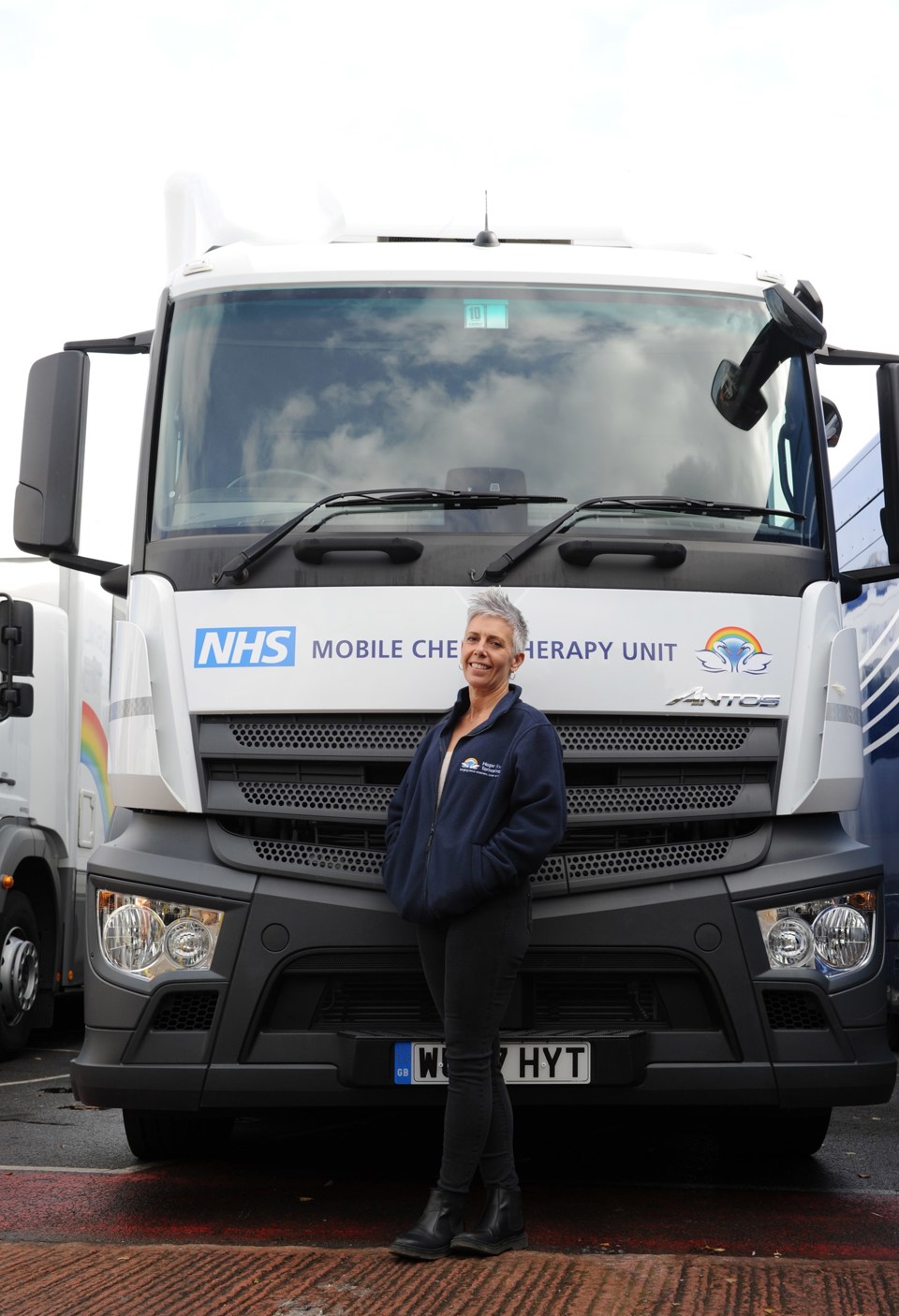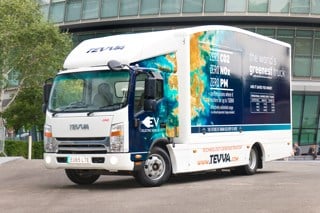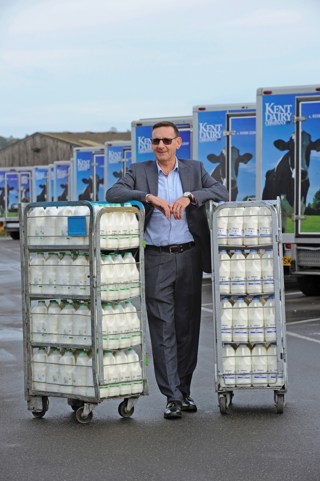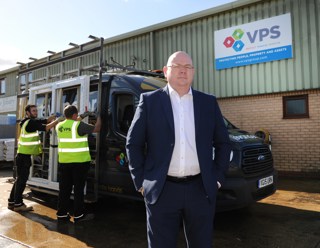Hope for Tomorrow is the world's first fleet of mobile chemo units, and it has saved patients over 2 million miles of travel and reduced its emissions, John Maslen reports.
Charities often run fleets of vehicles to support their fundraising efforts, but in some cases the vehicles themselves are the focus for funds.
Hope for Tomorrow is one such organisation. In its work as a national cancer charity it is dedicated to funding, building and maintaining the world’s first fleet of mobile chemotherapy units (MCUs).
The charity was founded by Christine Mills MBE after she lost her husband David to cancer.
During treatment, the couple had to travel nearly 60 miles from their home to the nearest oncology centre and she wanted the charity to alleviate the additional anxieties of travelling.
She met Dr Sean Elyan, consultant oncologist and medical director of the Gloucestershire Hospitals NHS Foundation Trust and discovered that he had a vision to bring chemotherapy closer to patients.
In 2007, the charity raised funds to build and launch the world’s first MCU and has marked its 10th anniversary this year.
In a unique partnership, the charity develops, owns and maintains the vehicles and they are operated by local NHS Foundation Trusts.
Hope for Tomorrow operates a small fleet of high-value assets.
There are 11 full-time units, supported by two relief ones which maintain service levels when frontline vehicles are being serviced or repaired.
Each mobile unit costs upwards of £260,000, funded through outright purchase, meaning the total value of the fleet is equivalent to a company operating hundreds of cars.
The fleet is overseen by Jayne Foster, operations co-ordinator, who has to manage several unique elements of its operation.
As there were no previous examples of MCUs anywhere in the world, the charity designed its own vehicles and still uses its own bespoke plans.
The units are based on a Mercedes-Benz Antos chassis that is taken to coachbuilders WH Bence, which designs and builds specialist vehicles and provides support services.
Foster says: “The build takes about three months from start to finish. We have the specification that the build was originally designed to and we monitor during production and provide sign-off.”
Strong relationships with quality suppliers are critical, she says, as the vehicles provided by the charity play a critical role in patient care.
This applies to the vehicle build and to the maintenance and replacement of equipment.
Foster adds: “As part of the build we install fridges, microwaves, chairs, medical grade kitchen area and toilets.
“These are critical items, used for care. For example, the fridges are used for chemotherapy drugs and the microwave is used for saline.
"We have a supply arrangement that can have the microwave replaced in a day if it breaks.”
WH Bence provides support with annual maintenance, while the chassis is regularly serviced by Mercedes-Benz dealership Rygor, which has 11 sales and after sales branches throughout the country.
Rygor focuses on minimising downtime and pledges to accept all ‘vehicle off road’ incidents into its workshops immediately and to start work on them within two hours.
The business claims one of the highest MOT pass rates in the country.
Foster said: “We rely on our suppliers hugely and we are lucky that we get such a good service from them. The big focus is keeping the wheels turning.
“We have to raise funds for maintenance costs and core operational costs to keep the charity operational.”
As vehicles are placed throughout the country and operate in a range of urban and rural environments, most attention is paid to vehicle condition and age rather than mileage, when it comes to replacement cycles.
Chassis are expected to last 15 years and during that time they would normally have two bodies, although rural areas might have more wear and tear because of the nature of local roads, for example from the impact of overhanging branches on smaller lanes.
Mileage is more of a focus when it comes to patients. A key benchmark is the impact the service has on patient travel, which was the inspiration behind the charity’s launch.
Foster said: “Since the launch of the first MCU in 2007, the charity has saved patients a total of over two million miles and more than 170,000 hours of travel and waiting time.”
An additional benefit is a reduction in costs for hospital parking and the congestion and emissions benefits of reducing patient travel.
The charity raises around £1 million a year through events. It estimates that provision of the service costs £40 per chemotherapy treatment, helping thousands of patients throughout the country.
Its work led to the charity receiving the Queen’s Award for Enterprise – Innovation, last year. The award is the UK’s highest accolade for business success, and was made in recognition of its achievements since launch.
Hope for Tomorrow has an ambitious plan for growth, with a long-term vision to have mobile cancer care units operating in every county of England and a five-year plan to extend the MCU fleet to 20 vehicles, while supporting the replacement of vehicles and bodies on the current fleet.
Foster, who worked as a civil servant for 30 years before joining the charity, said: “I was looking for a change of direction, something worthwhile, and I can’t think of anything better than what I do now.
“It is such a great feeling knowing that what I do is contributing to helping others through a difficult period in their lives.”
Risk management key to protecting high-value assets
Effective risk management is an important focus as the Hope for Tomorrow fleet operates high-value assets that rely on the generosity of donors to keep the wheels in motion.
While the charity pays for chassis acquisition, the construction of the MCUs and vehicle upkeep, day-to-day operation sits with individual NHS Trusts, including the provision of medical equipment, medicines, fuel and drivers.
This requires a close working partnership between the charity and treatment centres to plan vehicle deployment, monitor fleet use and manage maintenance schedules and repairs.
Before assets are deployed, a detailed risk assessment is carried out. Trusts provide a business plan that includes risk management and risk assessments.
Foster says: “It is all about detailed planning and there is a lot of work related to site risk assessments, where vehicles will be parked at night and training of staff.”
Training goes into detail on preparing the vehicle for use, including the deployment of stabilisers and processes at the end of the day, such as dealing with water and waste.
There may also be specific site checks to monitor and manage risks related to areas of deployment, such as supermarket car parks or sports centres, with issues covered including access and manoeuvring.
The charity team is then on hand to deal with any enquiries, such as where to dispose of waste and support for in-field repairs.
While NHS Trusts have their own risk management processes, any vehicle damage must be reported to the charity within 24 hours and if a repair is needed then a full briefing on the incident is required in seven days.
Incidents are rare, but Foster says reviews are thorough, adding: “We look at what happened, then whether it was avoidable and if there are any training requirements, but we have never had to say we don’t want a driver.
"They are very proud to work on these units and they take a responsible and professional attitude. The pride and passion they show is incredible.”
Downtime for operational vehicles is minimised through forward-planning, so that when units are brought in for routine servicing, which can take several days, any other issues are dealt with at the same time.
A car is provided with each MCU, so nurses can travel separately to avoid waiting for vehicles to be set-up at each location.
The fleet of 12 cars is made up of Mitsubishi Colts and Mirages, Ford Fiestas and Kia Ceeds.
Vehicles were outright purchased, but the fleet now leases through Activa Contracts, which has also donated a car to the fleet.
The fleet specifies five-door models, so nurses can get the required drugs from the pharmacy to the site using specially-adapted coolboxes.
External advice and expertise benefits charity fleet
Charities thrive on the commitment of a wide network of volunteers and for Hope for Tomorrow this includes key fleet contacts.
Expert advice and support is provided by the Fleet Industry Advisory Group (FIAG), which was created to mentor and share best practice in the fleet industry.
Founding FIAG member Geoffrey Bray became involved with the charity as the Mills’ were friends
of the family.
A FIAG team, led by Office Depot’s Freddie Watts and also including Graham Bellman, director of fleet services, Travis Perkins, Peter Weston, fleet manager at Arcus, and Bray, helped draw up the bodybuilder tender document and provided support in evaluating responses before choosing Bristol-based WH Bence.
Support has also come from Ged Raymond, former fleet manager at Autoglass.
Bray is also a patron of the charity and other patrons reflect the close connection the Mills had to motor racing, as they spent time managing drivers including five-times Le Mans winner Derek Bell.
Patrons from a motor racing background include Sir Stirling Moss OBE, Ross Brawn OBE, Derek Bell MBE, David Brabham and Martin Brundle.
Many patrons have been involved in naming vehicles on the fleet, often in memory of relatives who have died of cancer, including “Bumble” the nickname of Sir Stirling’s late mother-in-law, and Frisbey, the nickname of Martin Brundle’s grandmother.
Television presenter Gloria Hunniford, also a patron, named one MCU after Caron, her daughter, the former Blue Peter presenter, who died of cancer in 2004.
In the charity’s annual report, founder and CEO Christine Mills MBE, said: “We are a wonderful team at Hope for Tomorrow, we push each other to deliver the project and work so very hard. I wholeheartedly thank them all.
“I also want to take this opportunity to thank all our family of trustees, patrons, ambassadors, fundraisers, community champions, professional advisers and volunteers without whom we could not achieve so much.”


















Login to comment
Comments
No comments have been made yet.